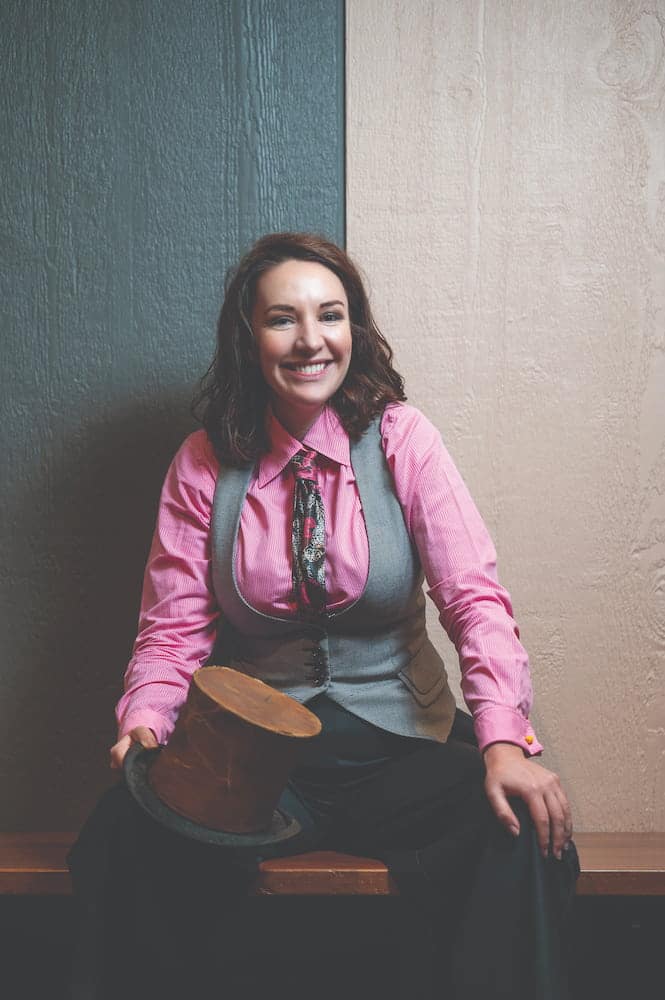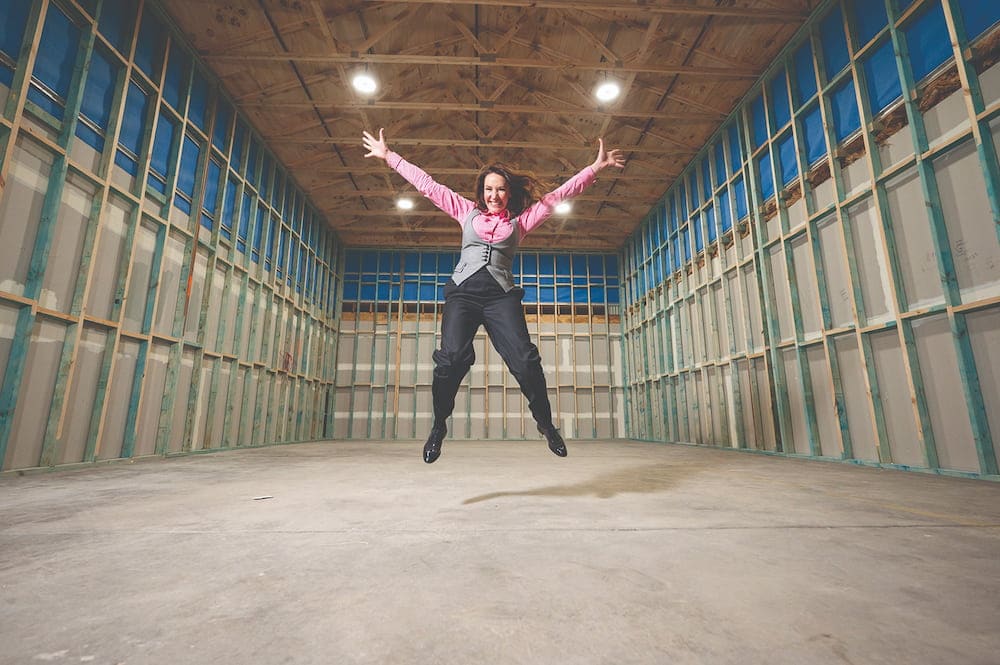The talented Lexi Sekuless, actress, producer, and former political arts adviser, has a vision for a new Canberra company where local performers and directors could develop their craft while enthralling audiences.
That vision will become reality this year. The new Mill Theatre, opening in Fyshwick’s Dairy Road Precinct this month, will be the theatrical troupe’s home, and its first season will be an exciting line-up of forgotten Australian masterpieces, rare Shakespeare, modern Broadway hits, and burgeoning Canberra talent.
The theatre is supported by the Molonglo Group, a developer interested in “the cultural offering, the cultural maturity” of Canberra, Ms Sekuless said.
The theatre at Dairy Road, in the heart of the precinct, will be a studio theatre, seating 71 people. It will be Canberra’s second producing venue after the Street Theatre, and here Ms Sekuless will bring her ensemble together.
The development of the program and the space is driven by her commitments to her craft and to arts policy more widely. The same commitments have driven her advocacy for a National Theatre, the absence of which she sees as a gap in the nation’s cultural life.
Her Dairy Road Players will be a fully professional troupe, with parts for emerging amateur performers who want to step into a professionally run rehearsal room.
Each play would run for a month: “It’s important for performers and for audiences to know that [the cast would] not just fly in for two nights, then fly out. It’s here: you can see it, you can catch it.”
The theatre would also train creatives who want to work backstage. Ms Sekuless would direct the first play, shadowed by an emerging director, who would then direct the second play, under her mentorship.
This is only the start; Ms Sekuless and the Molonglo Group have plans to build a bigger theatre in a couple of years.
Most of Canberra’s theatres are traditional proscenium designs, the auditorium facing the stage; but the new performing space will be ‘theatre-in-the-round’, the audience surrounding the stage on two sides.
There will also be underpasses (or ‘voms’, short for vomitoria, which amuses the builders) under the seats, so the performers can enter and exit from the sides.
“A studio space that has dynamism with lots of entrances and exits is absolutely the most fun to play with,” Ms Sekuless said.
She has been fascinated with theatre-in-the-round ever since she played in one of the most hallowed spaces of all: the Globe in London, where she played Lady Anne in Richard III in the Wannamaker Festival in 2013.
“It’s the best thing I ever did! Every seat in the house is closer than you would possibly imagine; it’s the most fun, the most exciting. You have to find all the elements of ‘live’ theatre that can never be achieved by something you watch on your laptop.”
She brought the same approach to the hugely popular Lakespeare series of the Bard’s comedies, of which she was co-producer and artistic director: “Even though it’s out in a big park, how can you still have a really close relationship with your audience?”
Lakespeare has “gone gangbusters”; the free open-air performances of Much Ado About Nothing (2018), Twelfth Night (2019), A Midsummer Night’s Dream (2020), and As You Like It (2022) have cast their spell over Canberra audiences.
But they are not quite the right model for performers to develop, Ms Sekuless thinks. That is what she intends the new theatre will solve.
Too often, Canberra creatives must leave town to establish themselves. Ms Sekuless herself has left and come back a couple of times.
“There isn’t a chance to develop or establish yourself in Canberra,” she said.
Canberrans appear in big shows around Australia like the Founding Fathers rap musical Hamilton or the Hogwarts Harry Potter and the Cursed Child – but they cannot say they come from Canberra professionally, because they did not establish themselves here, Ms Sekuless explains.
Even in bigger cities like Melbourne and Sydney, the main stages offer few opportunities for actors to develop; most engagements are short, two or three months.
Canberra itself suffers from a cultural cringe – to the point that some amateur and independent companies pay performers to come from elsewhere, if their budget allows.
“There’s an idea that if you’re from Canberra, it’s not good enough,” Ms Sekuless said.
Currently, only one professional theatre produces plays: the Street Theatre, near the ANU.
The Canberra Theatre Centre is only a venue for hire; although they are trying to produce, they only co-produce with outside companies, Ms Sekuless states.
“What is missing is Canberra’s theatrical voice and Canberra’s theatrical practice.”
The Canberra Theatre has received more than $4 million for redevelopment from the ACT Government – but that, Ms Sekuless says, is infrastructure funding (builders, concrete, and seats), not arts funding for programs.
This is the niche she believes she can fill.

“I’m a small venue dedicated to program, dedicated to the things that fill the building, as opposed to looking after the building first, and then expecting people to pay to hire that.”
Ms Sekuless emphasises that her new theatre would complement Canberra’s existing companies, “growing the industry horizontally”, rather than competing with them.
“The amateur scene is phenomenal – remarkably and beautifully large, and looked after by places like Rep, but any ecology is allowed to have a community element and a professional element.”
Every year, Mill Theatre at Dairy Road will put on four plays: a revival of Australian repertoire, a ‘tentpole’ (a commercially successful piece), an adaptation, and a gamble.
The season will begin with a revival of The Torrents (premiered 1957), by Oriel Gray, a little-known female playwright (and “card-carrying Communist”), and which the Playwrights’ Advisory Board voted best play of the year in 1955, with Ray Lawler’s Summer of the Seventeenth Doll.
“It’s like an Australian screwball comedy, and very socially progressive,” Ms Sekuless says.
The play is set in the 19th century, in the bureau of a regional newspaper, which needs more staff (the refrain of all newsrooms since time immemorial!). They eagerly await the new reporter, J.G. Milford – who turns out to be Jenny.
“In 1890s Australia, they need to accept a woman in the workplace. That’s reflected in what the town needs to accept in terms of their economic future; it’s a gold mining town, and they need to consider what to do for the environment and for their prosperity. So, it’s got a lot of themes that are still relevant today.”
The tentpole is the Tony-nominated Reasons to be Pretty (2008), by Neil LaBute.
“It’s a comedy four-hander about two working class couples accepting the realities of life, with the pressure to be beautiful and succeed.”
For Shakespeare enthusiasts, perhaps the most exciting works scheduled are adaptations of Shakespeare’s ‘First Tetralogy’ dealing with the War of the Roses: Henry VI parts I to III, and Richard III.
The Mill Theatre will stage them over four years – part of Ms Sekuless’s stratagem to develop a long-term relationship with audiences. Like Jane Howell’s superb adaptation for the BBC (1983), actors will return as different characters.
Believed to be Shakespeare’s earliest plays, these sprawling, violent, gripping historical chronicles established his reputation, but are seldom performed. Epic in scale, they feature struggles for the crown of England, civil war, kings deposed and murdered, battles, and popular uprisings.
The women’s roles are “phenomenal”, Ms Sekuless thinks. Beginning with Joan of Arc, and encompassing two queens and a witchy duchess, they are a gallery of women every bit as power-hungry and duplicitous as the men – who include the infamous “crookback Dick”, the Duke of Gloucester, later Richard III.
Although set in the 15th century, Ms Sekuless believes their themes are relevant today: “political gaming, factions, and what happens to a nation when the leaders and decision-makers have a bad and sick relationship with power”.
Building on the success of her ‘Rockspeare’ Richard III (2020), Ms Sekuless will use rock music to enhance their raw power.
“It’s not Shakespeare turned into a musical, but it is a sonic experience, in addition to the verse.”
In the small space of the studio theatre, these plays could be cataclysmic.
Finally, the gamble: a new play, written by a Canberran or Australian playwright. At this stage, Ms Sekuless is playing her cards close.
“A lot of venues around Australia say they want to promote work. Often, they rush and put it on. Whereas I want to develop a work.”
Influenced by the off-Broadway try-outs, previews will give these new plays opportunities to fail safely, so Ms Sekuless and the author can iron out the kinks.
While the first season features four plays, Ms Sekuless intends to increase the number of plays in later seasons. Other classics could include Euripides, Middleton, and Gorky and Chekhov.
“Anything in the space of the epic and the grand, I’m really fascinated by,” she said. “There’s nothing new under the sun. Even contemporary plays lean into myth. I hope that programming of looking back in order to help look forward can help with the new play and new development.”
And would she act herself? “Oh, yes! The whole reason that I’ve ever done any producing is so that I can have a part onstage. I love performing; I absolutely love it.
“When you’re running a lot of stuff, it’s really lovely and freeing when you can just turn up and do one part, and be responsible for just one storyline, one character.”
Exciting times for Canberra indeed. Ring up the curtain:
“Sound drums and trumpets! Farewell sour annoy!
For here, I hope, begins our lasting joy.”
– Shakespeare, 3 Henry VI
To find out more, visit www.milltheatreatdairyroad.com
For more information on sponsored partnerships, click here.



